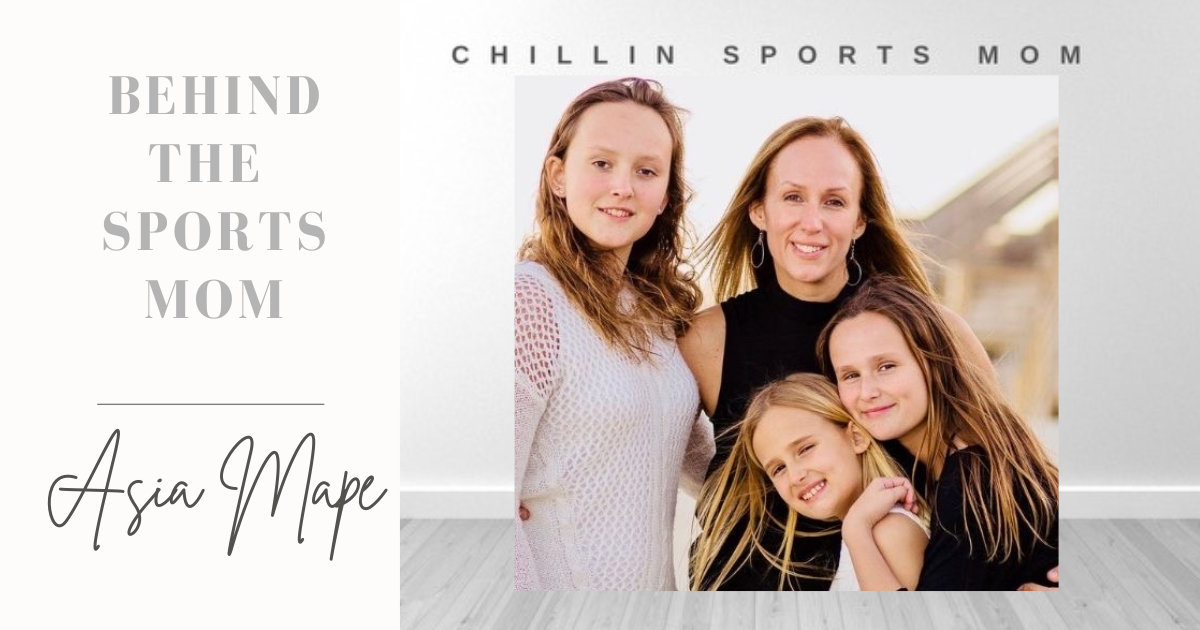Behind the Sports Mom with Asia Mape

Asia Mape is a 4-time Emmy Award–winning journalist and sports producer who’s worked with ESPN, Fox Sports, TNT, NFL Network, and NBC. She’s covered Olympics, Super Bowls, and more NBA playoff games than she can count - sitting down with the best of the best to tell their stories of grit, glory, and greatness.
But behind the camera, there’s another side to Asia’s story - because while she’s spent years capturing the lives of elite athletes, she’s also been raising a few of her own. She’s the mother of three daughters, and has spent the better part of the last two decades immersed in club soccer, basketball, field hockey, volleyball, and water polo. We’re talking 7–8 practices a week, tournaments almost every weekend, and enough schlepping to qualify as an Olympic event.
And while most of the time she loved it, there were moments - like all of us - when she wondered, Is there a better way to do this? That question became the spark behind I Love to Watch You Play, the go-to platform for sports parents looking for honest guidance, humor, and real-talk tools for raising healthy, happy athletes (while keeping the whole family somewhat sane).
In this Behind the Sports Mom interview, Asia gets candid about her own youth sports mom life including memories, her proudest mom moments, and what she’s learned after twenty years in the game.
This one’s packed with inspiration, sideline smarts, and a reminder that the best words we can say after a game are often the simplest: “I love to watch you play.”
First lets start with Asia’s very own sports journey:
Before you were a sports mom, you were an athlete yourself… What did sports mean to you growing up?
It meant everything.
It was an escape from what was going on at home. It gave me confidence. And it introduced me to my best friends—people who are still in my life to this day.
What sport(s) did you play, and what kind of player were you?
I played all sports growing up, but basketball was my favorite. I was a lefty and played small forward or guard. I was scrappy, physical, and a strong rebounder for my size. I loved playing pickup any chance I got. I played softball in high school, but basketball was always the one I loved most.
Was there a coach or mentor who really shaped you as a young athlete?
Not really. My oldest brother played a lot of sports with me and liked to work with me, but he left for college when I was in 8th grade, so he wasn’t around much during my later years. My dad was always into physical activity—he was a karate instructor, and I was a black belt as a kid. His love of running, yoga, and martial arts gave me a really good foundation and balance.
Looking back, how did being an athlete prepare you for motherhood - especially the sideline kind?
I was competitive - still am. And in some ways, that was a gift. I understood effort. I valued commitment. I knew how to push through hard things. But when my kids first started playing sports, that same competitive fire sometimes got the best of me. I’d overanalyze, get frustrated, expect too much. I’ve had to unlearn a lot of that. I’ve had to remind myself that this is their experience, not mine. It’s taken time, but now I try to show up in a way that supports who they are, not just how they perform.
If you could go back and give your younger athlete self one piece of advice, what would it be?
I wish I didn’t play it so safe. I was a really good athlete, and I had the potential to be even better—but I held back. I’d rather pass than take the last shot and miss. And I hate admitting that, but it’s true. I wish I had more guts. More chutzpah. I wish I had believed in myself enough to go for it, even if it didn’t work out.
Asia’s Sports Mom Life
You’ve been deep in the sports mom world for a long time - what’s one thing you wish someone had told you at the beginning of the journey?
I wish someone had told me how fast it would all go. That the endless practices, the early mornings, the car rides—they don’t last forever. And also, that my role wasn’t to control the experience, but to support it. I spent too much time early on trying to get everything “right” when what my kids really needed was for me to just be there, steady and proud, no matter what.
What do you think is the most misunderstood part of being a youth sports parent?
That it’s not about being pushy or living through your kid—it’s about caring deeply and not always knowing what to do with that and sometimes that love and pressure get tangled.
You’ve interviewed top athletes, coaches, and experts — what’s one piece of advice you took to heart and used/still use with your own kids?
Stay curious. Instead of reacting, ask questions. Instead of assuming, listen. Whether it’s a coach talking about development or an athlete describing what support really feels like, I’ve learned that the best way to connect with my kids is to be more of a student than an expert. It’s helped me show up with less pressure and more presence.
How do you handle the pressure (and the parents)? Give us your best “chill” advice.
I’ve learned to protect my energy. I stay in my lane. I focus on supporting my kid. I try to be a calm presence, not add to the chaos. My best “chill” advice? Don’t mirror the energy around you. Set the tone you want your kid to feel. And if all else fails, find a quiet spot at the end of the bench and just enjoy watching them play.
What’s a youth sports myth that you just want to bust wide open?
That more is always better. More teams, more training, more tournaments—that it all somehow guarantees success. It doesn’t. Sometimes more just means burnout, injuries, and a kid who quietly stops loving the game. What actually works? The right coach, a healthy environment, time to rest, and a kid who wants to be there. That’s where growth happens—not in the overstuffed calendar.
When the game doesn’t go their kids' way, how can a parent help them?
Start by pausing. Most kids don’t need a breakdown of what went wrong—they need space. Let them feel what they feel without trying to fix it right away. Later, when they’re ready, ask questions instead of giving advice. “What felt hard today?” or “What do you want to do differently next time?” Just showing up with empathy—and not analysis—can make all the difference. They’ll remember how you made them feel way more than what you said.
You’re a journalist, a founder, and a sports mom - how did you (and do you) juggle everything?
My work spans the whole day—not because I’m constantly grinding, but because I build in time to walk my dogs, take a yoga class, go to the gym, and juggle all the different balls I have in the air. For the most part, my schedule is my own, which helps—but I still try (not always successfully) to be present when my kids and Dave are home. I’ll work when they’re doing their own thing, but I do my best to shut it down when it counts. It’s not perfect, but I’m learning to protect what matters most, even in the middle of the chaos.
What has youth sports taught you as a mom?
It’s taught me to let go. To stop trying to script the perfect experience and just walk beside my kids as they figure things out for themselves. It’s taught me that growth doesn’t always look like success—and that the hard moments often shape them more than the wins. I’ve learned to listen more, to trust more, and to show up with support instead of solutions. Most of all, it’s taught me that this isn’t about me—it’s their story. I just get the gift of being close enough to watch it unfold.
What’s your favorite “I can’t believe this happened” sports mom moment?
Honestly, it’s not about the outcome—I say that all the time. But sometimes, the outcome is a powerful reflection of everything that came before. The work. The growth. The messy middle. The way a team finds its rhythm. The way your kid discovers their fire. When it all clicks—those moments can mean something, too.
There was winning a water polo CIF championship. Winning a beach volleyball CIF championship. Moments that were about far more than the final score—they were about a group of girls learning to trust each other, sacrifice for one another, and come together when it mattered most. The joy wasn’t just in the win—it was in the community that carried them there.
There was my daughter getting the call from Ohio State. Visiting LMU with my youngest and feeling this overwhelming sense of peace, knowing that’s exactly where she’s meant to be.
Each of those moments took a million invisible steps to reach—injuries, setbacks, long practices, honest conversations, and quiet confidence slowly building over time.
Each moment was different—but all of them were filled with joy. And more than anything, I just feel so much gratitude.
If you could create one rule for youth sports that everyone had to follow, what would it be?
Every kid leaves the field feeling seen—for who they are, not just how they played.
Whether they scored the winning goal or barely touched the ball, every athlete deserves a moment of acknowledgment, encouragement, or connection. Because long after the game ends, what sticks with them isn’t the stat line—it’s how the adults around them made them feel.
What’s something you learned from watching your kids play that you never expected?
How much braver they are than I ever was. I’ve watched them step into pressure, bounce back from mistakes, try again after heartbreak—all with a kind of quiet courage I don’t think I had at their age. It’s made me realize that showing up isn’t always loud or flashy. Sometimes it’s just choosing to keep going.
And with Piper, I’ve learned something equally powerful: the strength it takes to follow your own path. To walk away from something, even when you're good at it, and choose a direction that feels more true to who you are. That kind of clarity and self-trust? I didn’t expect to learn that from my kids—but I have.
What’s your proudest sports mom moment — the one that still makes you tear up a little?
The moments that get me the most are never about stats or trophies. It’s when a coach takes the time to acknowledge whomy daughters are—not just as athletes, but as people. Being great at their sport is wonderful, but being recognized for their character, leadership, kindness—that means everything.
There have been letters from coaches, awards, or little moments in end-of-season speeches where someone points out the kind of human they are—and those are the ones that always get me. Because at the end of the day, that’s the only thing that matters.
How did you manage keeping perspective when things got intense - the politics, the pressure, the playing time drama? What advice can you give other parents?
To be clear—I haven’t always managed it well. The stories I could tell… Sports parenting is HARD. I’ve said things, done things, and reacted in ways I regret. I probably get it right 95% of the time, but that other 5%? I still wrestle with it, especially in the moments that push my buttons.
The advice I always come back to is this: Listen more. Talk less. And most importantly—prepare yourself.
I’m obsessed with the ride to the game, not the ride home. That’s where we have the most power—not just in how we speak, but in how we show up. I try to mentally walk through the day ahead. What could come up? A bad call, limited playing time, another parent’s energy. How do I want to respond? How do I want my kid to feel with me in the stands?
It’s not always perfect. But the more intentional I am before the game starts, the more likely I am to be the parent I want to be when it matters.
Fill in the blank: Being a sports mom is ________.
Being a sports mom is hard in all the ways that matter.
It’s hard to watch them struggle. Hard to stay quiet when you want to fix it. Hard to separate your heart from their performance. But it’s also the most meaningful kind of hard—because it means you care deeply, you’re invested, and you’re walking alongside them as they grow.
What inspired I Love to Watch You Play? Please share how it has evolved.
It started with a simple phrase from Proactive Coaching that stopped me in my tracks: “I love to watch you play.” It hit something deep. At the time, I was juggling the chaos of parenting three daughters in competitive sports—and realizing how much pressure we all put on ourselves, as parents and as kids. We wanted to create a space where families could breathe a little. A place that reminded us what really matters.
At first, I Love to Watch You Play was just about helping parents navigate the youth sports world—offering guidance, resources, and perspective. But over time, it’s grown into something bigger. It’s become a platform rooted in empathy, connection, and shared experiences. It’s evolved into a voice for sports parents who want to raise strong, balanced, joyful kids—not just successful athletes.
It’s not about having all the answers. It’s about asking better questions, showing up with intention, and remembering that this journey we’re on with our kids is about so much more than sports.
Where everyone can find Asia:
Founder: I Love to Watch you Play Here: https://linktr.ee/iltwyp
Facebook: Ilovetowatchyouplay
Newsletter: Newsletter
Instagram: @theilovetowatchyouplay
Email: Asia@Ilovetowatchyouplay.com





Leave a comment